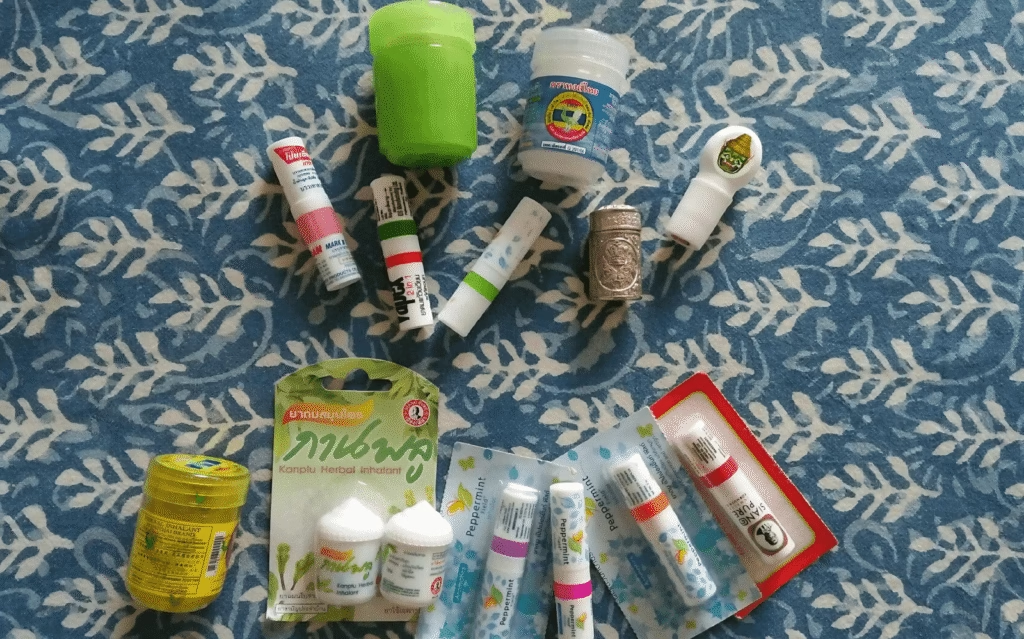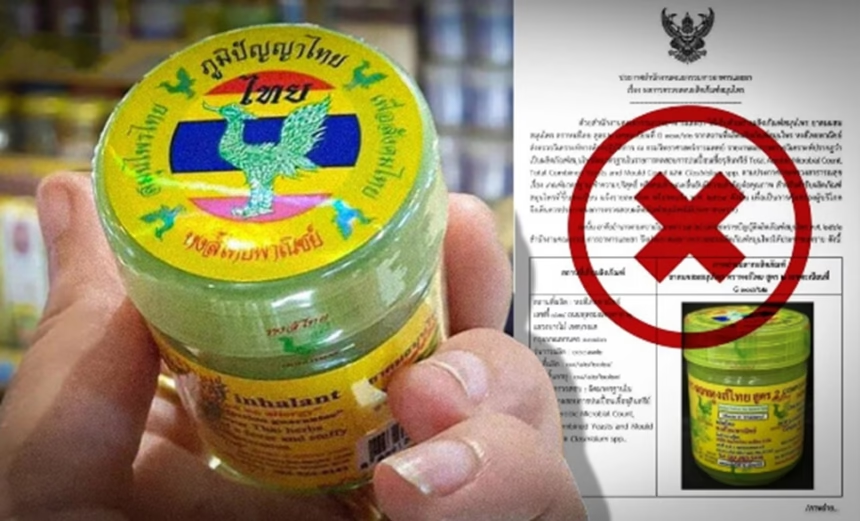BANGKOK – The Food and Drug Administration has issued a public alert after lab tests found microbial contamination in the herbal inhaler “Hong Thai Formula 2”, registration number G 309/62. The item, made by Hong Thai Panich, has been ruled substandard under the Herbal Product Act.
In an announcement dated 20 October, the FDA said samples of Hong Thai Herbal Inhaler Formula 2 were taken from the factory and sent to the Department of Medical Sciences for testing.
Results showed the product failed microbial safety limits in three areas: total aerobic microbial count, total combined yeasts and mould count, and the presence of Clostridium spp., a spore‑forming bacterium.
These breaches go against the Ministry of Public Health’s 2021 quality rules for registered herbal products. The FDA has designated the product as substandard under the Herbal Product Act 2019.
Herbal inhalers, known in Thailand as yadom (ยาดม) or ya dom, sit at the heart of local tradition and everyday healthcare. These small portable tubes release aromatic vapours from herbs and essential oils when you sniff them through the nose.
People have used them for millennia for aromatherapy. Today, they are everywhere in Thailand, sold in 7‑Eleven, markets, and pharmacies, and listed as a generic household medicine by the Thai Ministry of Public Health. Many people carry one for hot days, long commutes, or stressful situations, often placing the tip near the nostril for fast relief.
They are also a cultural symbol. Yadom appears in Thai series like Netflix’s Mad Unicorn, and fans include Blackpink’s Lisa, Chris Hemsworth, and Jackson Wang. In 2023, Hong Thai alone reported sales of 300 million baht, around US$9.5 million.

What are herbal inhalers in Thailand?
Herbal inhalers, yadom (ยาดม) or ya dom, are a familiar part of Thai life and traditional remedies. Each device is small and easy to carry, delivering scented vapours from herbs and essential oils as you inhale. Their use stretches back more than 2,000 years and grew in popularity during the reign of King Rama II (1809 to 1824) for aromatherapy.
Today, you can find them across Thailand, including every 7‑Eleven, countless market stalls, and most pharmacies. The Thai Ministry of Public Health lists them as a generic household medicine. People reach for them in the heat, on buses, or during long days, often holding the tube near the nostril for a quick lift.
They serve style as well as function. Yadom shows up in Thai dramas like Netflix’s Mad Unicorn and attracts celebrity fans such as Blackpink’s Lisa, Chris Hemsworth, and Jackson Wang. In 2023, Hong Thai recorded about 300 million baht in sales, close to US$9.5 million.
Common types and forms
Yadom comes in several formats to suit different habits:
- Stick or tube inhalers: slim plastic or metal tubes, like the classic white Poy Sian sold since 1936, with a wick soaked in oils.
- Dry herb jars: pieces of dried botanicals, such as peppermint or lemongrass, in small bottles or tins for sniffing.
- Liquid roll‑ons: bottles of essential oils for dabbing on skin or inhaling.
- Balm versions: semi‑solid pastes, similar to Vicks VapoRub, for sniffing or topical use.
Popular brands include:
| Brand | Key features | Best for |
|---|---|---|
| Poy Sian | Menthol‑forward, slim white tube, low cost (about 20 to 30 THB). | Daily refresh, light dizziness. |
| Hong Thai | 15+ herbs in eucalyptus oil, versions include green (original), white (menthol‑led), or intense. | Congestion, stress, vertigo. |
| Hanuman | Peppermint‑led, natural blend in wide‑neck bottles. | Nasal relief, relaxation. |
| Hong Khu | Dry plant herbs, hypoallergenic, over 15 medicinal plants. | Migraines, brain fog. |
| Golden Dragon | Floral‑leaning mix with jasmine and menthol. | Soothing aromatherapy. |
Many are handmade or small‑batch, often using family recipes. Prices range from 20 to 100 THB (US$0.60 to US$3) in Thailand, and many sellers ship online, including Amazon and Thai export sites.
Ingredients and how they work
Most blends use familiar Thai herbs and essential oils known for cooling and uplifting scents:
- Menthol, from peppermint, clears the nose and sharpens alertness.
- Camphor: cooling feel, can ease headaches and irritation.
- Eucalyptus oil: helps with stuffiness and fatigue.
- Other botanicals: borneol, lemongrass, clove, or jasmine for aroma and a light mood boost.
How to use: open the tube or jar, hold a short distance under your nose, and inhale for 2 to 5 seconds. Repeat when needed. It feels like a quick, natural pick‑me‑up, compact and non‑addictive.
Benefits
Many users say yadom helps with:
- Nasal congestion, mild allergies, and sinus discomfort.
- Dizziness, motion sickness, and vertigo.
- Headaches, nausea, and tiredness.
- Focus and mood during work or travel.
- Stress or mental fog in humid, polluted conditions.
Travellers and locals often call it a small survival tool for Bangkok traffic or long‑haul flights. Some luxury hotels, such as Anantara, offer custom blends as part of wellness retreats.
Safety and precautions
Generally safe when used occasionally, but:
- Avoid overuse. Take short sniffs. Heavy or frequent use can irritate the nose or trigger allergies, especially from camphor or menthol.
- Not suitable for everyone. Pregnant people, young children, those with asthma, or anyone with sensitivities should speak to a doctor.
- Recent alert: as of 28 October 2025, Thailand’s FDA issued a health warning for a specific batch of Hong Thai inhalers due to possible contamination risks, so check batch numbers and avoid affected products.
- Many countries do not approve these as medicines. Treat them as aromatherapy, not a cure.
Where to get them in Thailand
- Everywhere: 7‑Eleven, pharmacies like Boots or Watsons, night markets, and airports.
- Specialty shops: herbal stores in Bangkok’s Chinatown, and wellness events such as the KAWS: Holiday Thailand pop‑up in May 2025, where workshops sometimes offer DIY tips.
- Online and gifts: export sites like ThaiByNature.com or Amazon ship worldwide, and fans often share them as small presents at K‑pop events.
If you are in Thailand now (October 2025), grab a Poy Sian for under 20 THB and see why locals love it. For custom blends or workshops, check nearby spas or community events. Safe travels.














